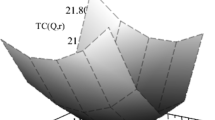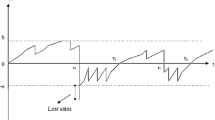Abstract
We consider a class of single-stage, single-product Make-to-Stock production-inventory system (MTS system) with backorders. The system employs a continuous-review base-stock policy which strives to maintain a prescribed base-stock level of inventory. In a previous paper of Zhao and Melamed (Methodology and Computing in Applied Probability 8:191–222, 2006), the Infinitesimal Perturbation Analysis (IPA) derivatives of inventory and backorders time averages with respect to the base-stock level and a parameter of the production-rate process were computed in Stochastic Fluid Model (SFM) setting, where the demand stream at the inventory facility and its replenishment stream from the production facility are modeled by stochastic rate processes. The advantage of the SFM abstraction is that the aforementioned IPA derivatives can be shown to be unbiased. However, its disadvantages are twofold: (1) on the modeling side, the highly abstracted SFM formulation does not maintain the identity of transactions (individual demands, orders and replenishments) and has no notion of lead times, and (2) on the applications side, the aforementioned IPA derivatives are brittle in that they contain instantaneous rates at certain hitting times which are rarely known, and consequently, need to be estimated. In this paper, we remedy both disadvantages by using a discrete setting, where transaction identity is maintained, and order fulfillment from inventory following demand arrivals and inventory restocking following replenishment arrivals are modeled as discrete jumps in the inventory level. We then compute the aforementioned IPA derivatives with respect to the base-stock level and a parameter of the lead-time process in the discrete setting under any initial system state. The formulas derived are shown to be unbiased and directly computable from sample path observables, and their computation is both simple and computationally robust.
Similar content being viewed by others
References
Cassandras, C. G., & Lafortune, S. (1999). Introduction to discrete event systems. Boston: Kluwer Academic.
Cassandras, C. G., Wardi, Y., Melamed, B., Sun, G., & Panayiotou, C. G. (2002). Perturbation analysis for on-line control and optimization of stochastic fluid models. IEEE Transactions on Automatic Control, 47, 1234–1248.
Cassandras, C. G., Sun, G., Panayiotou, C., & Wardi, Y. (2003). Perturbation analysis and control of two-class stochastic fluid models for communication networks. IEEE Transactions on Automatic Control, 48(5), 770–782.
Fan, Y. (2008). Stochastic models for make-to-stock production-inventory systems. PhD Dissertation, Rutgers Business School—Newark and New Brunswick, Newark, New Jersey.
Fan, Y., Melamed, B., Zhao, Y., & Wardi, Y. (2009). IPA derivatives for make-to-stock production-inventory systems with backorders under the (R,r) policy. Methodology and Computing in Applied Probability, 11(2), 159–179.
Fu, M. C., & Hu, J. Q. (1997). Conditional Monte Carlo: gradient estimation and optimization applications. Boston: Kluwer Academic.
Heidelberger, H., Cao, X. R., Zazanis, M., & Suri, R. (1988). Convergence properties of infinitesimal analysis estimates. Management Science, 34, 1281–1302.
Kleinrock, L. (1975). Queueing systems, Vol. 1: Theory. New York: Wiley.
Panayiotou, C., & Cassandras, C. G. (2006). Infinitesimal perturbation analysis and optimization for make-to-stock manufacturing systems based on stochastic fluid models. Discrete Event Dynamic Systems, 16(1), 109–142.
Paschalidis, I. C., Liu, Y., Cassandras, C. G., & Panayiotou, C. G. (2004). Inventory control for supply chains with service level constraints: a synergy between large deviations and perturbation analysis. Annals of Operations Research, 126, 231–258 (Special Volume on Stochastic Models of Production-Inventory Systems).
Rubinstein, R. Y., & Shapiro, A. (1993). Discrete event systems: sensitivity analysis and stochastic optimization by the score function method. New York: Wiley.
Wardi, Y., Melamed, B., Cassandras, C. G., & Panayiotou, C. G. (2002). On-line IPA gradient estimators in stochastic continuous fluid models. Journal of Optimization Theory and Applications, 115(2), 369–405.
Zhao, Y., & Melamed, B. (2006). IPA gradients for make-to-stock production-inventory systems with backorders. Methodology and Computing in Applied Probability, 8, 191–222.
Zhao, Y., & Melamed, B. (2007). IPA gradients for make-to-stock production-inventory systems with lost sales. IEEE Transactions on Automatic Control, 52(8), 1491–1495.
Author information
Authors and Affiliations
Corresponding author
Rights and permissions
About this article
Cite this article
Melamed, B., Fan, Y., Zhao, Y. et al. IPA derivatives for a discrete model of make-to-stock production-inventory systems with backorders. Ann Oper Res 181, 1–19 (2010). https://doi.org/10.1007/s10479-009-0662-9
Published:
Issue Date:
DOI: https://doi.org/10.1007/s10479-009-0662-9




